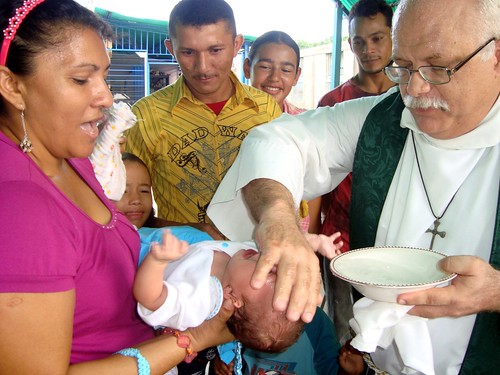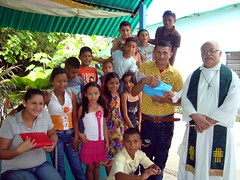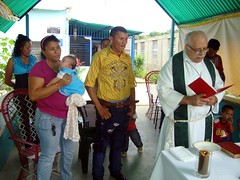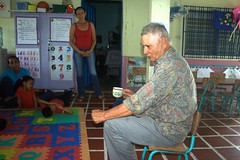
Anyi Vanesa Garrido Santana was baptized Saturday, June 19, 2010, on her brother José Ignacio's second birthday.
Over the years I had assisted in the baptisms of children and adults, but this was the first time that I said the words of baptismal regeneration, "I baptize you in the name of the Father, the Son and the Holy Spirit" and applied the water. It was a most moving moment, as I had explained to all involved that in her baptism, God Himself called Anyi by name and adopted her as His child through faith in Jesus Christ.
To me it was a marvelous thing how the appointed lessons in the one-year lectionary for June highlighted this event. On June 6, I preached on Luke 16:19-31, the parable of Lazarus the beggar at the rich man's gate. In truth, we do not deserve anything good from God. In His eyes, we are all dirty, disgusting beggars like Lazarus in our Lord's parable. We are sinners who deserve eternal punishment in hell. By nature, we are enemies and rebels against God. However, as the epistle for that day (1 John 4:16-21) said, God is love and in His love sent His only Son to be the Savior of the world. Christ suffered and died on the cross, so that we might have the promise of eternal life with God. Therefore, we will have no fear on Judgment Day, for we will be saved by grace.

On June 13, I preached on Luke 14:15-24, the parable of the great banquet, symbolizing the invitation to eternal life, which begins not in the remote future, as the Pharisee believed, but right now as we are born again of water and the Spirit. That is why Jesus emphasized the immediacy and urgency of the Gospel.
The text for June 20, Luke 15:11-32, the parable of the prodigal son, was most appropriate both for the baptism of Anyi and for Father's Day, for it spoke of a father's unmerited love for his sons and his desire to save the one that was lost.
Dr.David P. Scaer, chairman of the systematic theology department at Concordia Theological Seminary, Fort Wayne, Indiana, calls "(the) popular slogan "Word and sacrament," a phrase so much a part of Lutheran theology that it enjoys a stellar ranking of the second magnitude,slightly below the three solas" (faith alone, grace alone, Scripture alone). My years of observation and study in Venezuela have confirmed the truth of this for me, especially if you tack another word, "ministry", onto "Word and sacrament." Nowadays, "ministry" is loosely used to mean almost any kind of good work, but the one true ministry of the church is the public preaching of the Word and the administration of the sacraments.
In an article published in the January-April edition of Concordia Theological Quarterly, Dr. Scaer explains that although baptism is in itself a one-time act, "The continued effective force of baptism becomes visible and audible in the assembly of the worshipping Christian congregation. The believers assemble as the baptized, and the rite of baptism is repeated and reflected in the church's liturgy. The triune invocation derives its authority from the One who instituted baptism, and again the name of the Father and of the
Son and of the Holy Ghost becomes the possession of the baptized. Sins are confessed as a repetition of the denouncing of Satan's kingdom and are forgiven again in the name of the Triune God to whom the believer belongs by baptism. The faith's requirements are repeated in the credal recitation. True worship of the church is the commemoration of baptism."
Dr. Scaer continues to say that, "Preaching should not be viewed as a separate function but rather it represents to the believer that same Christ in whose death and life he
shared through baptism. Preaching directs unbelievers to baptism to find Christ and believers back to baptism to reestablish their faith in Him. The organic unity between baptism and preaching must be preserved." In the Great Commission, the command to "teach them all the things that I have commanded you" does not precede, but follows the command to baptize and make disciples of all nations (implying that it is the sacrament of baptism that makes disciples).

Since in baptism we receive the gift of new life in Christ, once and for always, it does not make sense that this sacrament should be denied to infants. However, since the command to teach follows the command to baptize, the church, the community of believers, has the responsibility for the continued instruction in the faith of those who have been baptized.
There is a custom in Venezuela, and I have witnessed this myself, called "postura de agua." In many parts of Venezuela today as in times gone by, the Catholic priest will visit a village once a year to celebrate Mass and perform marriages and baptisms. However, many people grew impatient with waiting for the priest to show up either to formalize sexual unions or perform baptisms. So the concept of "postura de agua" arose. The man of the house does an abbreviated version of the baptismal rite and immediately after splashing water on the baby "in the name of the Father, the Son and the Holy Ghost," they immediately - and I mean immediately roll out the beer and finger-food for a big party. There is no sense of the beginning of a new life in Christ and the need to continue nurturing the child in faith and prayer. However, it is not the ritual itself or the phonetic formula, "In the name of the Father, Son and Holy Ghost" that gives baptism its power, but the Holy Spirit acting through the Word (the proclamation of forgiveness of sins in Christ) and the water (as the visible element of the sacrament), creating faith in the baptized and strengthening the faith already inspired in those who bring the child forward for adoption in the family of God, that is, the church.
Change can be painless
We have changed our hour of Sunday service from 4 p.m. to 10 a.m. Originally it was set at 4 in the afternoon because I had the responsibility of assisting with the morning service at Corpus Christi Lutheran Church in Barinas. Now I do not have that duty and we long have a problem with the later hour. That is, at 4 p.m. the tropical sun is situated at just the right angle to shine under the roof of our covered patio. No one wanted to sit in the direct sunlight (you wouldn't, either). We tried various means of providing shade, but nothing really worked. So we changed the hour to 10 in the morning and no one seems to mind at all.

History of La Caramuca
On June 16, 2010, the preschool children had the privilege of hearing Lorenzo Medina talk about the history of La Caramuca. Mr. Medina was president of the town council from 1982 to 1992. While the city of Barinas is more than 400 years old, La Caramuca emerged as a community in 1948. The first deeds to the land were written in the late 1800s, but until the 1940s the entire area was the private property of one or two families. From 1948 to 1974 there were only 16 houses in La Caramuca, now home to around 5,000 people. Mr. Medina also spoke of various local legends and landmarks, including la Casa de las Piedras (House of Stone), a geological oddity that I have not seen, but would like to.
